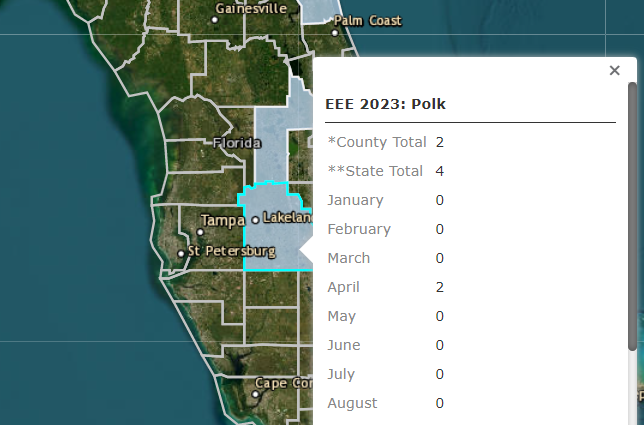The Florida Department Agriculture and Consumer Services reported two cases of Eastern Equine Encephalitis (EEE) in horses in Polk County.
 The first case (the third overall in the state) was a 10-year-old Pony Cross gelding who exhibited symptoms on April 7 of depression, muscle witching, incoordination and inability to stand. The case was confirmed on April 18.
The first case (the third overall in the state) was a 10-year-old Pony Cross gelding who exhibited symptoms on April 7 of depression, muscle witching, incoordination and inability to stand. The case was confirmed on April 18.
The horse was euthanized.
The second case (the fourth overall) is a unvaccinated, 1-year-old quarter horse colt who showed symptoms of depression, lethargy, inability to stand and recumbent on April 10.
He was confirmed positive for EEE on April 19.
There have been four EEE cases in the state of Florida to date–Lake County (1-January), St. John’s County (1-February) and Polk County (2-both in April).
Eastern Equine Encephalitis (EEE) is spread to horses and humans by infected mosquitoes, including several Culex species and Culiseta melanura.
EEE is one of the most dangerous mosquito-borne diseases in the U.S. with a 90 percent fatality rate among horses that become ill and a 33 percent fatality rate among humans who become ill.
In horses, the virus causes inflammation or swelling of the brain and spinal cord. General symptoms include central nervous system signs such as: head pressing, convulsions, lack of response to facial stimulation, fever above 103 degrees, ataxia, paralysis, anorexia, depression and stupor. Other symptoms may include irregular gait, teeth grinding, in-coordination, circling, and staggering. All symptoms may not be exhibited by an infected horse.
The disease is not spread by horse-to-horse or horse-to-human contact. In humans, signs of EEE include the sudden onset of fever, chills, and body and joint aches. The virus can also cause severe encephalitis, resulting in headaches, disorientation, tremors, seizures, and paralysis. Permanent brain damage, coma, and death may occur in some cases.
FLORIDA REPORTS 20% DECREASE IN ANIMAL RABIES CASES IN 2022
NEW HAMPSHIRE OFFICIALS WARN OF INCREASE OF ANIMAL TRANQUILIZER, XYLAZINE







3 Comments